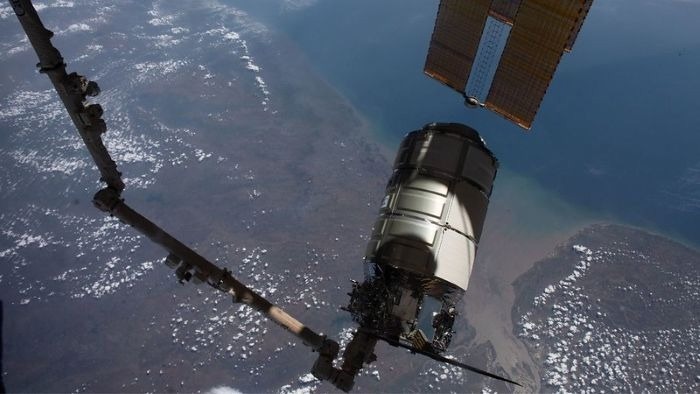On September 14 at 6:11 p.m. EDT, NASA’s Northrop Grumman Commercial Resupply Services 23 mission is set to launch on a SpaceX Falcon 9 rocket from Cape Canaveral Space Force Station, carrying more than 15 International Space Station (ISS) National Laboratory-sponsored investigations. These projects could help improve medicine production, make the orbit around Earth safer, and enhance technology used in television, computer, and smartphone screens.
 The Cygnus space freighter from Northrop Grumman is pictured in the grips of the Canadarm2 robotic arm as the International Space Station orbited 258 miles above the Arabian Sea coast of India in 2023. Image Credit: NASA
The Cygnus space freighter from Northrop Grumman is pictured in the grips of the Canadarm2 robotic arm as the International Space Station orbited 258 miles above the Arabian Sea coast of India in 2023. Image Credit: NASA
Supported by the ISS crew, these payloads aim to advance research and technology to benefit life on Earth and drive a robust market economy in low Earth orbit (LEO). Below highlights some of the projects launching on this mission.
- Arizona State University, in collaboration with BioServe Space Technologies, will examine how germicidal ultraviolet light delivered through optical fibers could inhibit the formation of harmful biofilms in water systems. The project, funded by the U.S. National Science Foundation, aims to provide a safer, more cost-effective alternative to traditional disinfectants. Results could be used to protect life support systems on spacecraft during long-duration missions and in drinking water systems on Earth where water purification infrastructure is not available.
- Revolution Space will test the performance and safety of an advanced electric propulsion system in LEO. This new technology could provide a more efficient way to maneuver spacecraft and satellites and allow for more precise control.
- Bristol Myers Squibb is conducting its latest series of crystal growth experiments using Redwire Space’s Pharmaceutical In-space Laboratory. The more uniform crystals produced in microgravity can be used to improve the formulation and production of medications on Earth.
- TransAstra Corporation will utilize Voyager Space’s Bishop Airlock to test the deployment of an inflatable Capture Bag system, a simple and affordable solution to space debris collection. In a growing LEO economy, the ability to capture and control space debris will be crucial to make the orbit around Earth safer for astronauts, satellites, and spacecraft.
- Voyager Technologies’ LEOcloud Space Edge™ will demonstrate cloud computing infrastructure on the space station and its ability to integrate with terrestrial networks. Space Edge aims to allow users to analyze data in space at speeds that can support research while it’s being done, marking an important step toward advancing the future of human spaceflight, microgravity R&D, Earth observation, lunar exploration, and national security. Sierra Space provided Implementation Partner services to Voyager LEOcloud for this project.
- In association with Voyager Technologies, the country of Thailand will launch its first-ever investigation to the space station. Researchers from Kasetsart University will study liquid crystal films in microgravity. Results from this research could help improve liquid crystal display (LCD) technology for energy-efficient, high-resolution, thin displays in electronics such as computer screens and smartphones used in space and on Earth.
These investigations reflect the growing demand for space-based R&D and the expanding role of the space station as a platform for innovation. The ISS National Lab is proud to support these efforts, pushing the limits of science and technology in space to benefit life on Earth.